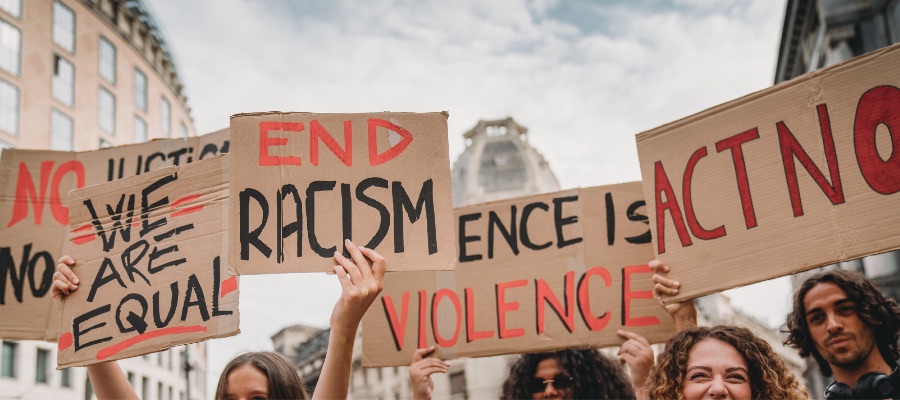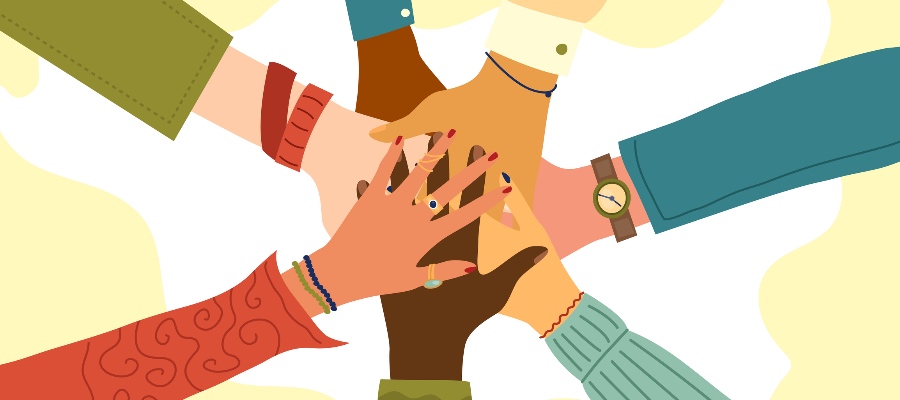The views expressed in our content reflect individual perspectives and do not represent the authoritative views of the Baha'i Faith.
If you have a deep understanding of the systemic racism that marginalized communities experience, regularly provide support to victims of racism, and have made great strides to tackle racism on an individual level, then you may be ready to move from an ally to an accomplice.
Ally Versus Accomplice: What Is the Difference?

In social justice work, the terms “ally” and “accomplice” are commonly used to describe the type of activism and advocacy that some privileged people are doing for oppressed groups.
As I explained in the first article in this series on how to be a better ally for racial justice, becoming an ally is a process that involves learning about racial inequities and injustices and providing support to people of color.
According to an article published by Learning for Justice, “An ally will mostly engage in activism by standing with an individual or group in a marginalized community. An accomplice will focus more on dismantling the structures that oppress that individual or group — and such work will be directed by the stakeholders in the marginalized group.”
As Shoghi Effendi, the Guardian of the Baha’i Faith, wrote in 1938:
The principle of the Oneness of Mankind—the pivot round which all the teachings of Bahá’u’lláh revolve—is no mere outburst of ignorant emotionalism or an expression of vague and pious hope. Its appeal is not to be merely identified with a reawakening of the spirit of brotherhood and good-will among men, nor does it aim solely at the fostering of harmonious cöoperation among individual peoples and nations. Its implications are deeper, its claims greater than any which the Prophets of old were allowed to advance.
Its message is applicable not only to the individual, but concerns itself primarily with the nature of those essential relationships that must bind all the states and nations as members of one human family. It does not constitute merely the enunciation of an ideal, but stands inseparably associated with an institution adequate to embody its truth, demonstrate its validity, and perpetuate its influence. It implies an organic change in the structure of present-day society, a change such as the world has not yet experienced.
While allies typically focus on unlearning their racism and addressing racist behaviors when they witness it, accomplices also strive to end racism on an institutional level.
If you’ve only heard of the word “accomplice” in the legal system, this term might have a negative connotation for you. However, in the context of racial justice work, an accomplice shares the responsibility and risk of working to dismantle these oppressive systems. They are proactive and help create safe, diverse, inclusive, just, and equitable environments.
Fostering these nurturing spaces for people of color is a priority for the Baha’i community. Shoghi Effendi stated that “every organized community enlisted under the banner of Bahá’u’lláh should feel it to be its first and inescapable obligation to nurture, encourage, and safeguard every minority…”
How to Move From Ally to Accomplice

Long before we used the terms “ally” and “accomplice” in the context of racial justice advocacy, Shoghi Effendi explained what privileged demographics must do to help achieve racial healing in the United States. He wrote:
Let the white make a supreme effort in their resolve to contribute their share to the solution of this problem, to abandon once for all their usually inherent and at times subconscious sense of superiority, to correct their tendency towards revealing a patronizing attitude towards the members of the other race, to persuade them through their intimate, spontaneous and informal association with them of the genuineness of their friendship and the sincerity of their intentions, and to master their impatience of any lack of responsiveness on the part of a people who have received, for so long a period, such grievous and slow-healing wounds.
It’s easy to understand what sincere intentions and genuine friendships look like, but what does a “supreme effort” mean?
Merriam Webster defines supreme as “highest in degree or quality” and “ultimate” and defines effort as “conscious exertion of power: hard work,” “a serious attempt,” “something produced by exertion or trying,” “effective force as distinguished from the possible resistance called into action by such a force” and “the total work done to achieve a particular end.”
At a talk in England in 1911, Abdu’l-Baha, the authorized interpreter of the Baha’i writings and the son of Baha’u’llah, the prophet and founder of the Baha’i Faith, said:
Every effort must have its result, else it is not a true effort. You must become the means of lighting the world of humanity. This is the infallible proof and sign. Every progress depends on two things, knowledge and practice. First acquire knowledge, and, when conviction is reached, put it into practice.
Here are tips on how you can make a supreme effort and put your knowledge into practice:
Becoming an Accomplice: Advocacy Tips on How to Advance Racial Equity and Justice

1. Address Racism in Institutions
Social media raises awareness of so many incidents of racism at schools, parks, traffic signals, restaurants, pools, etc. When you witness or learn about an act of discrimination, contact the company, or organization, and register your complaints. Whether the company was racist themselves, or they didn’t defend a person who experienced racism at their establishment, they need to hear from voices like you to persuade them to make amends and prevent racist incidents from happening in the future. And, if they don’t listen to you, please consider boycotting them and giving your money to companies that advance racial justice.
2. Support Solutions That Will Enact Change
There are many wonderful organizations that have come up with solutions to enact positive change. For example, Campaign Zero has proposed 10 evidence-based policy solutions to reduce police violence in the U.S. These solutions include mandatory anti-bias testing and allowing prosecutors to independently investigate police officers who kill civilians. This website has a helpful tool where you can track what states have enacted legislation that address these solutions. You may want to contact the police chief and government representatives in your area to advocate for the policies that have not been enacted.
3. Prevent Gentrification
Gentrification is the influx of wealthier people moving into a poorer neighborhood, displacing the current residents who live there.
Stanford sociologist Jackelyn Hwang explained, “As neighborhoods gentrify, when poor people can no longer remain in their neighborhoods and move, there are fewer affordable neighborhoods. Our findings suggest that, for the Black community, there are additional constraints when they move, leading them to move to a shrinking set of affordable yet disadvantaged neighborhoods within the city.” This causes marginalized communities to move to neighborhoods that have fewer resources and opportunities.
The National Spiritual Assembly of the United States, the administrative governing body for the Baha’is in the U.S., addressed this systemic racism in 1991. In “The Vision of Race Unity,” they wrote:
Prejudice and discrimination have created a disparity in standards of living, providing some with excessive economic advantage while denying others the bare necessities for leading healthy and dignified lives.
Poor housing, deficient diet, inadequate health care, insufficient education are consequences of poverty that afflict African Americans, American Indians, and Hispanic Americans more than they afflict the rest of the population.
So, if you are selling or renting your home, you may want to consider selling or renting to a person of color from a historically marginalized community at a lower price point.
4. Employ People of Color
According to the Public Religion Research Institute, 75 percent of white Americans have “entirely white social networks without any minority presence.” And, according to Zippia, 70.8% of business owners are white.
As long as employers rely on referrals from their network when new positions are open, they will maintain a homogenous organization. You can’t have a diverse and inclusive organization if you don’t recruit, hire, and promote people of color and advertise job positions on diverse platforms.
5. Mandate Anti-Bias and Diversity Training at Your Company
The National Spiritual Assembly of the Baha’is of the United States stated:
Evidence of the negative effect of racial and ethnic conflict on the economy has prompted a number of businesses and corporations to institute educational programs that teach conflict resolution and are designed to eliminate racial and ethnic tensions from the workplace. These are important steps and should be encouraged.
You may want to consider mandating unconscious bias training at your company and hiring consultants, or specialists, to make your workplace a more diverse and inclusive environment.
6. Advocate for Diverse Curriculums at Schools in Your Area
If you are a parent, teacher, or concerned citizen, please consider advocating for diverse curriculums at schools in your area. The inventions and heroic achievements that people of color have made throughout history should be taught and celebrated just as much as the achievements of white people.
Also, please suggest that curriculums and reading lists include books about our nation’s true history of racial oppression and literature that reflects diverse cultures, identities, and perspectives.
In 2018, the School Library Journal found that “only 22% of school librarians reported that their book lists were ‘somewhat diverse’.” In an interview with Caribu, Kiera Parrott, the reviews and production director for School Library Journal, said, “There are more children’s books about talking animals and trucks than there are about all other racial/ethnic groups combined.” As you advocate for schools to start implementing diverse reading lists, you can also buy diverse books for the children in your lives.
In a response to the supreme efforts that privileged demographics make, Shoghi Effendi asked Black people to “show by every means in their power the warmth of their response, their readiness to forget the past, and their ability to wipe out every trace of suspicion that may still linger in their hearts and minds.”
He wrote, “Let neither think that anything short of genuine love, extreme patience, true humility, consummate tact, sound initiative, mature wisdom, and deliberate, persistent, and prayerful effort, can succeed in blotting out the stain which this patent evil” of racism has left on our nation.
God bless you all in your efforts to blot out this stain of racism from your institutions and communities.
















Comments
Sign in or create an account
Continue with Googleor